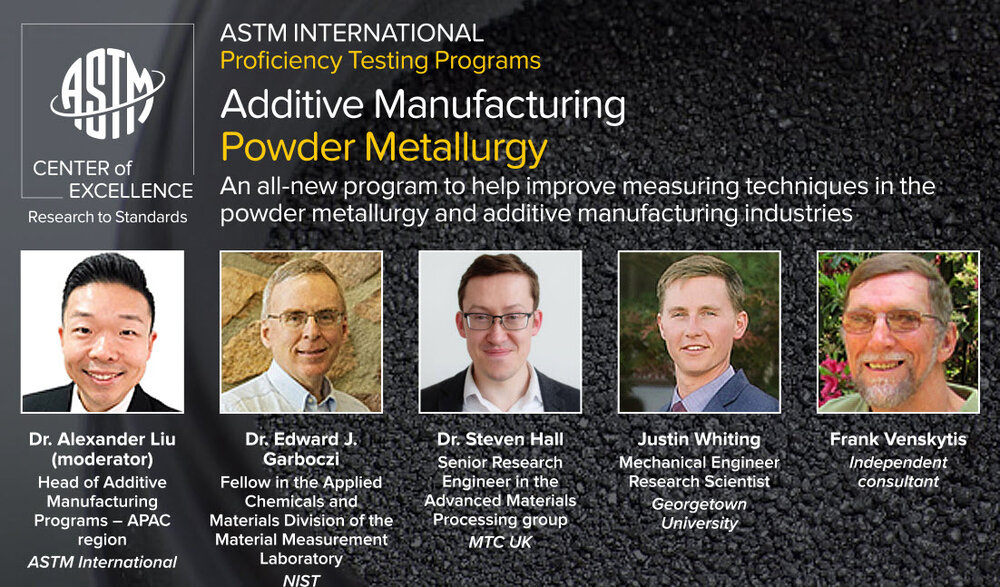About the Webinar
The Additive Manufacturing and Powder Metallurgy (AMPM) Proficiency Testing Program (PTP) participation offers organizations to demonstrate their lab’s testing capabilities for metal powder and in turn satisfy accreditation requirements. Participation at the AMPM PTP helps organizations improve and maintain high level of performance in the use of ASTM methods and compare with other labs worldwide. It is also seen as a QA tool to monitor lab’s strengths and weaknesses. Participants receive a comprehensive benchmark report on the statistics of test results and understand characteristics of powders (such as apparent density, flow rate and particle size). Participants can use test results as a benchmark for creating acceptance criteria.
This webinar is intended to provided a detailed understanding about the ASTM International’s proficiency testing program for metal powder used in additive manufacturing. The webinar covers topics such as importance of powder quality in AM, the methodology in performing PTP program, the benefits in becoming a part of this program, different ASTM and ISO standards used in characterization of metal powders, how to participate in this program and the value obtained for the program participants. This webinar is offered free of charge.
This webinar was held on Wednesday, August 5, 2020 at 9:00am EDT and is now available for on-demand viewing.
Learning Outcomes
- Learn the 20 different test methods used in powder characterization for powder qualification in this program.
- Learn how statistical analysis is used in PTP program to create a benchmark report that can be used for creating acceptance criteria.
- Learn other methods such as ASTM D795-14 used for identifying outliers in statistical analysis.
- Learn how AMPM PTP’s participation can help demonstrate lab’s testing capabilities and satisfy accreditation requirements.
Moderator
-
Moderator
Dr. Alexander Liu
Show MoreDr. Alexander Liu is Head of Additive Manufacturing Programs – APAC region at ASTM International responsible for ASTM AM center of excellence (CoE) and various AM programs in APAC region. He has a B.Eng in Mechatronics and Robotics Automation and a PhD in Mechanical Engineering, focusing on process and materials characterization for metal additive manufacturing. One of his roles at ASTM International is involved in the Additive Manufacturing (AM) and Powder Metallurgy (PM) Proficiency Testing Program (PTP) to help organizations improve measuring techniques in the PM and AM industries.
Panelists
-
Panelists
Frank Venskytis
Show MoreFrank Venskytis holds degrees in Physics and Metallurgical Engineering. For 27 years, he managed a testing laboratory for what is now known as Global Tungsten & Powders Corporation, performing various powder characterization and mechanical property tests. Frank has been a member of ASTM Committee B09 on Metal Powders and Metal Powder Products for 39 years and Committee E29 on Particle and Spray Characterization for over 30 years. He is a past Chair of Committee B09 and currently chairs Subcommittee B09.03 on Refractory Metal Powders, since 1990. He is currently an independent consultant, working mostly on standardization of powder characterization methods, especially for powders used in additive manufacturing.
-
Panelists
Dr. Edward J. Garboczi
Show MoreDr. Edward J. Garboczi is a Fellow in the Applied Chemicals and Materials Division of the Material Measurement Laboratory at the National Institute of Standards and Technology (NIST) in Boulder, Colorado. Dr. Garboczi’s research focuses on the computational materials science of random composite materials. As part of this effort, he has used a novel combination of X-ray microcomputed tomography and spherical harmonic analysis to build quantitative 2D and 3D mathematical models of random-shaped particles of cement, sand, gravel, metal powders for additive manufacturing, and lunar soil. Dr. Garboczi received the Robert L’ Hermite Medal from RILEM in 1992, a Silver Medal from the Department of Commerce in 2009, the 2009 Edward C. Henry award from the American Ceramic Society’s Electronics Division, the 2012 Della Roy Lecture award from the American Ceramic Society’s Cements Division, and the 2014 Robert E. Philleo award from the American Concrete Institute. He is a Fellow of both the American Ceramic Society and the American Concrete Institute, and a member of the American Physical Society.
-
Panelists
Justin Whiting
Show MoreJustin Whiting is a mechanical engineer research scientist at Georgetown University with an interest in the development of measurement science for additive manufacturing. With over than eight years’ experience in additive manufacturing research, Justin has worked on a variety of topics including calorimetry of the directed energy deposition process, non-destructive evaluation of AM parts both in situ and post-process, characterization of precursor AM materials, and AM machine design. Justin’s research career began with a DARPA project focused on acoustic emission monitoring of micro-end mill tool wear at Northern Illinois University where Justin studies Mechanical Engineering. This evolved into work led by Justin that implemented acoustic emission systems in mass flow monitoring of the multi-phase fluid flow in the powder fed directed energy deposition process. Since then, Justin has focused his research on the study of metal AM precursor materials. His recent work at NIST and Georgetown University has included characterization of particle size and morphology, spreadability and rheology, and the thermal properties of metal powders. Justin has been active in the AM standards community serving as chair of multiple America Makes & ANSI Additive Manufacturing Standardization Collaborative (AMSC) groups, a member of multiple joint ISO-ASTM working groups, and a member of ASTM F42.
-
Panelists
Dr Steven Hall
Show MoreDr Steven Hall, Senior Research Engineer in the Advanced Materials Processing group at MTC, has been involved in manufacturing R&D for over 10 years. Joining MTC in 2015, Steven has focused on the development of powder-based manufacturing processes such as Additive Manufacturing (AM) and Hot Isostatic Pressing, for sectors including aerospace and defence. Steven has technically lead and project managed innovation projects on powder-process-part development, novel feedstock characterisation methods and AM standards development as part of ASTM’s AM Centre of Excellence (CoE) R&D projects.








